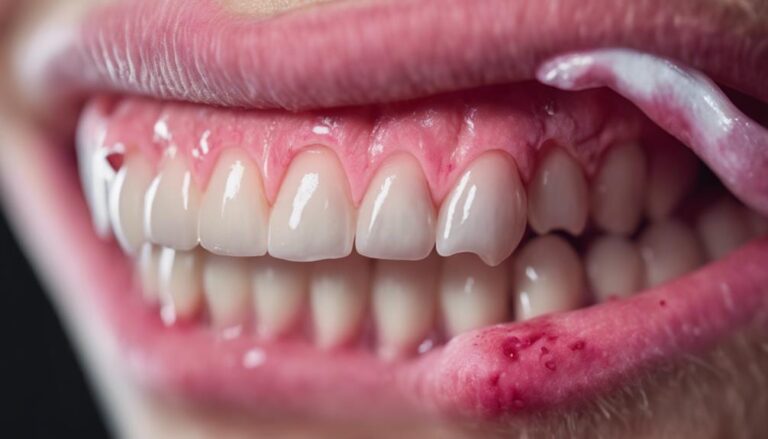Tea tree oil, a potent remedy, fights bacteria and reduces inflammation for gum disease and halitosis. Aloe vera gel, with its healing properties, soothes and combats microbes. Oil pulling, an ancient practice, enhances oral health with antimicrobial oils. Saltwater rinse is cost-effective, promotes gum health, and fights bacteria. Probiotics balance oral microbiome, reducing gum disease and bad breath. Vitamin C aids gum healing, found in citrus fruits. Green tea’s antioxidants fight inflammation and bacteria for fresh breath. Learn more about these natural remedies to enhance oral health and combat gum disease and halitosis.
Key Takeaways
- Tea Tree Oil: Fights bacteria, reduces inflammation, and alleviates symptoms of gum disease.
- Aloe Vera Gel: Soothes gums, combats bacteria, and reduces inflammation effectively.
- Oil Pulling: Coconut and sesame oils have antimicrobial properties for oral health.
- Saltwater Rinse: Promotes gum health, fights bacteria, and freshens breath naturally.
- Probiotics: Balance oral microbiome, reduce inflammation, and freshen breath.
Tea Tree Oil
When combating gum disease and halitosis, Tea Tree Oil is a significant natural remedy that I highly recommend incorporating into your oral care routine. The benefits of Tea Tree Oil in oral health are well-documented. Its effectiveness in fighting bacteria and reducing inflammation in the gums makes it a valuable tool in preventing and treating gum disease. Studies have shown that Tea Tree Oil can help reduce the symptoms of gingivitis and periodontitis, two common forms of gum disease.
However, it’s important to exercise caution when using Tea Tree Oil. While generally safe for most people when used topically in the mouth, some individuals may experience side effects such as irritation or allergic reactions. It’s important to dilute Tea Tree Oil properly before use and perform a patch test to check for any adverse reactions. Pregnant or nursing women should consult with a healthcare provider before using Tea Tree Oil. By following safety precautions and using Tea Tree Oil appropriately, you can harness its powerful benefits for improved oral health.
Aloe Vera Gel
Aloe Vera Gel is a potent natural remedy widely recognized for its soothing and healing properties in oral care routines. When it comes to gum disease and halitosis, aloe vera benefits are plentiful. The gel derived from the aloe vera plant contains antimicrobial and anti-inflammatory properties, making it effective in reducing inflammation in the gums and combating bacteria that cause bad breath.
To apply aloe vera gel for oral health, simply extract the gel from an aloe leaf and directly massage it onto the gums. Alternatively, aloe vera gel can be found in many oral care products such as toothpaste and mouthwash.
While aloe vera is generally safe for oral use, there are some precautions to keep in mind. In rare cases, aloe vera may cause allergic reactions such as itching or a rash. It’s always advisable to do a patch test before using aloe vera gel extensively in your oral care routine. As with any natural remedy, it’s recommended to consult with a healthcare professional before incorporating aloe vera gel into your oral care regimen.
Oil Pulling
Utilizing the ancient practice of oil pulling can greatly enhance oral health and combat issues like gum disease and halitosis. Coconut oil, known for its numerous benefits, is a popular choice for oil pulling. Its antimicrobial properties help reduce harmful bacteria in the mouth, promoting healthier gums and fresher breath. Swishing a tablespoon of coconut oil around the mouth for about 15-20 minutes each day can be a beneficial addition to your oral care routine.
Sesame oil pulling is another effective method for maintaining dental health. Sesame oil is rich in vitamins and minerals that can help strengthen teeth and gums. This practice involves swishing a tablespoon of sesame oil in the mouth, similar to coconut oil pulling. The oil helps to remove toxins and bacteria, contributing to improved oral hygiene.
Both coconut oil and sesame oil pulling are natural and safe ways to support oral health. Incorporating these practices into your daily routine can complement regular brushing and flossing, leading to a healthier and happier smile.
Saltwater Rinse
Incorporating a saltwater rinse into your daily oral care routine can help promote gum health and freshen your breath. Saltwater rinses have been used for centuries as a natural remedy for various oral health issues.
To prepare a saltwater rinse, simply dissolve half a teaspoon of salt in a glass of warm water. Gargle the solution in your mouth for about 30 seconds and then spit it out.
Saltwater rinses are beneficial for oral hygiene as they help reduce inflammation and fight bacteria in the mouth. The salt works as a natural disinfectant, making it effective in killing harmful bacteria that can lead to gum disease and bad breath. Additionally, saltwater rinses can aid in healing minor mouth irritations and sores.
Incorporating a saltwater rinse into your daily dental care routine can be a cost-effective and natural way to maintain good oral health. Remember, while saltwater rinses can be a helpful addition to your oral hygiene practices, they aren’t a substitute for regular brushing, flossing, and dental check-ups.
Probiotics
To further enhance oral health and combat gum disease and halitosis, exploring the benefits of probiotics can be valuable. Probiotics are live beneficial bacteria and yeasts that are good for your health, particularly your gut health and oral microbiome.
Here are five key points to contemplate when incorporating probiotics into your oral care routine:
- Balancing Oral Microbiome: Probiotics can help maintain a healthy balance of bacteria in the mouth, reducing the risk of gum disease and bad breath.
- Supporting Gut Health: A healthy gut is linked to overall well-being, including oral health. Probiotics can support gut health, which in turn can positively impact oral health.
- Reducing Inflammation: Probiotics have anti-inflammatory properties that can help reduce inflammation in the gums, a common symptom of gum disease.
- Fighting Pathogenic Bacteria: By crowding out harmful bacteria, probiotics can help prevent the growth of pathogenic bacteria in the mouth.
- Freshening Breath: Probiotics can help combat halitosis by promoting a healthier oral environment and reducing the presence of odor-causing bacteria.
Vitamin C
Vitamin C plays an essential role in maintaining healthy gums and preventing gum disease. Citrus fruits are well-known for their high vitamin C content, which is vital for collagen synthesis, a protein that helps in the formation of healthy gum tissue. Additionally, vitamin C acts as an antioxidant, aiding in the healing process of damaged gums by reducing inflammation and fighting off harmful bacteria. Ensuring an adequate intake of vitamin C through sources like oranges, lemons, grapefruits, and strawberries can contribute greatly to gum health and disease prevention.
| Vitamin C Benefits | Sources | Recommended Daily Intake |
|---|---|---|
| Collagen synthesis | Oranges | 90 mg for men |
| Antioxidant properties | Lemons | 75 mg for women |
| Gum tissue health | Grapefruits | Higher doses may be needed for smokers |
| Healing of gums | Strawberries | Excessive intake may cause digestive issues |
Incorporating these citrus fruits into your diet can not only boost your vitamin C levels but also promote overall gum health.
Green Tea
Green tea is renowned for its numerous health benefits, including its potential to improve gum health and combat halitosis. As an avid tea drinker, I can attest to the positive effects it can have on oral health. Here are some reasons why green tea is a powerful natural remedy for gum disease and bad breath:
- Antioxidant Benefits: Green tea is rich in antioxidants that help reduce inflammation in the gums and fight bacteria that cause bad breath.
- Catechins: These compounds found in green tea can help kill the bacteria in the mouth that lead to plaque formation and gum disease.
- Polyphenols: Green tea contains polyphenols that have been shown to reduce the growth of bacteria in the mouth, promoting better oral health.
- Fresh Breath: The catechins in green tea can help freshen breath by inhibiting the growth of odor-causing bacteria.
- Prevention: Regular consumption of green tea can help prevent gum disease and maintain overall oral health due to its antibacterial properties.
Incorporating green tea into your daily routine can be a simple yet effective way to support your oral health.
Frequently Asked Questions
Can Gum Disease Be Passed on Through Kissing?
Yes, gum disease can be transmitted through kissing due to the exchange of saliva containing bacteria. Maintaining good oral hygiene, such as regular brushing and flossing, can help prevent bacterial transfer and reduce the risk of transmission.
How Often Should Oil Pulling Be Done for Best Results?
Oil pulling, when done daily for about 10-15 minutes, can yield excellent results. Its benefits include reducing harmful bacteria, improving oral hygiene, and freshening breath. Incorporating it into a routine can enhance overall oral health.
Are There Any Side Effects of Using Tea Tree Oil for Gums?
I’ve researched tea tree oil for gum health. It’s crucial to note potential risks like allergic reactions. The effectiveness varies; consider proper dosage. Alternative treatments exist. Research studies can offer insights for informed choices.
Can Probiotics Help With Bad Breath in Addition to Gum Health?
Probiotics are like superheroes for oral health, fighting bad breath and promoting gum health. These beneficial bacteria offer natural solutions, balancing the mouth’s microbiome. Incorporating probiotics can be a game-changer for fresh breath and a healthy smile.
Is It Safe to Consume Green Tea if I Have Sensitive Gums?
Green tea benefits are vast, but for those with sensitive gums, caution is advised. While generally safe, excessive consumption may worsen sensitivity. Consulting a dentist is wise to confirm it aligns with your dental needs.
Conclusion
To sum up, by incorporating natural remedies such as tea tree oil, aloe vera gel, and oil pulling into your oral hygiene routine, you can effectively combat gum disease and halitosis. These remedies offer a holistic approach to oral health, addressing the root causes rather than just masking symptoms.
Just like a flourishing garden needs nurturing and care, your gums and breath will benefit from the healing properties of these natural remedies. Embrace the power of nature for a healthier smile.






